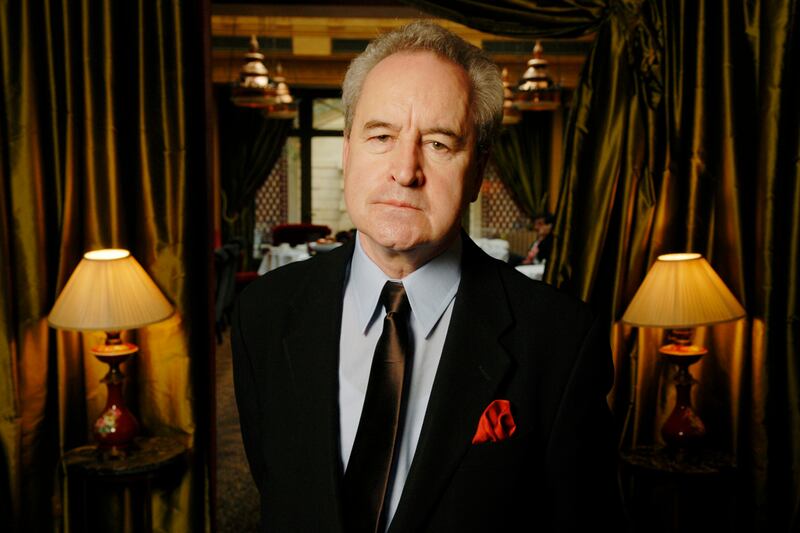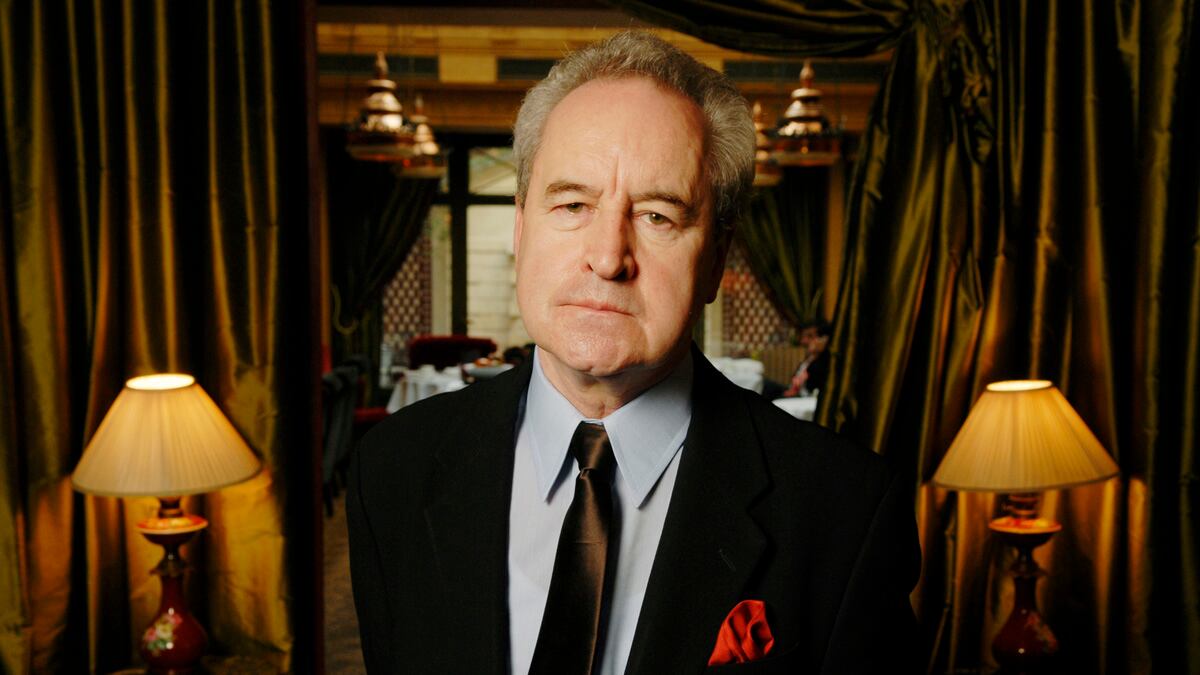I’m putting this spoiler alert up front. If you don’t want to hear one of the most shocking revelations in modern literature, stop reading now.
Benjamin Black is John Banville. I know because he admits it in about 20 recent interviews, from print to NPR, where he’s plugging his new Benjamin Black mystery, A Death in Summer (his fifth, the fourth featuring his Dublin pathologist, Garret Quirke). The fact is also mentioned in a blizzard of profiles, including Joanna Kavenna in The New Yorker. In fact, I have a sneaking suspicion that everyone knew that Black was Banville long before this. What I don’t have a clue about is why so many pretend that Banville-is-Black is itself some kind of mystery.
After reading gobs of this sort of stuff, I yearn for Sam Spade to step in and slap the writer hard across the face and say, “People lose teeth talking like that.”
What “disguises” did Banville put on to become Black? What shadows did he slip to and from? Jaysus, it says in the author’s profile on his dust jackets that Black is Banville. Why does everyone want to imagine there’s some sort of mystery here? What if Banville just wanted to write a mystery story and make some money? Or maybe, like the Ian McEwan he professes to despise, get a lucrative and well-earned movie deal.
Neil Jordan, himself a pretty good novelist, would be perfect to direct the movie version of A Death in Summer, and Sean Bean would be a terrific choice for Quirke—or, if you want to swing for the fences, Russell Crowe. Marion Cotillard would be spot on as the enigmatic French widow. I can already see her cat’s eyes narrowing in the final scene where she tells Quirke, “You think you know so much, but really, you know so little ... You are all the same.”
But I digress, enough with the “man who wears two masks” nonsense, as if Banville must justify writing mystery novels. Here he is apologizing recently on NPR for using a pseudonym that no one believed was a pseudonym in the first place: “I just wanted Banville readers to know this was something different, and it wasn’t an elaborate postmodernist literary joke.” No chance of that, boyo. The last novel written under Banville’s name, The Infinities (2009), was an elaborate postmodern joke. (My copy lies in back of a bookcase where I threw it in frustration before I got to page 100.)

According to Banville’s editor, Andrew Kidd, with A Death in Summer, “His main intent is to entertain.” So what was Banville’s intent with his “art’ novels—to edify? Why all this double talk and evasion about a hugely enjoyable foray into genre fiction? Why should he have to explain himself? If Banville didn’t write these books for money, then Dr. Johnson and I both think he’s a blockhead.
Again, Banville to NPR: “I never ask. Asking about sales, believe me, is like asking your bank manager about your bank balance. It’s always a shock and a disappointment, so I don’t ask.” Well, I think he’s going to enjoy asking about this one.
There’s a really dirty secret lurking in these Quirke novels, and I think it’s this: John Banville loves pulp. He revels in it; it seems to release something in him. Banville on NPR: “With Banville you get concentration, with Black you get spontaneity.” Good, if you have to call yourself Benjamin Black in order to write prose that sounds spontaneous instead of studied, more power to you.
As British critic Tibor Fischer remarked of The Infinities, “There’s lots of lovely language, but not much novel.” Banville seemed to be running on empty with that book, but Quirk has energized him (four Quirke novels since 2006). I don’t know why Banville thinks it’s necessary to use a silly pseudonym for crime novels; the obvious comparison should be Graham Greene, who had a perfectly good career writing “serious” novels along with what he jokingly referred to as “entertainments,” books like The Third Man and This Gun For Hire, to name just two of the most popular, that helped establish the tone and texture of noir and which may outlast all of his so-called serious work—just as, dare I say it, the Quirke novels may outlive Banville’s other books. And Greene didn’t feel the need for a secret identity.
In his 1986 book, A Short History of Irish Literature, Shamus Deane wrote that “With the appeared of John Banville’s Long Lankin (1970) and Nightspawn (1971) it was obvious that an important writer had arrived, although in what his importance consisted was not clear.” I suspect that what motivated Banville to become Black was a growing weariness with being so self-conscious about his role in modern Irish-English letters, a position so rarefied that he had long since left early contemporaries like John McGahern, who he was sometimes confused with, behind.

Or, stated another way, he was tired of trying to catch Nabokov, but there was an opening for Raymond Chandler, so he took it. This is a judgment I’m sure Banville would disagree with. In an essay for Bookforum on his love of pulp fiction, he went out of his way to denigrate Chandler. Chandler’s detective, Philip Marlowe, he wrote, was “a parfait genteel knight whose suit of shining armor illuminated the meanest of those mean streets down which he resolutely ventures. Upon mature reflection, I consider the Marlowe books forced and even a touch sentimental, for all their elegance and wit and wonderful sheen ... A far greater writer, James M. Cain, was happy to keep it raw, who glorified indeed, in the rebarbative, created a masterpiece, seemingly effortlessly, in The Postman Always Rings Twice.”
I’m not buying it. Cain wrote one good book, Postman, and a shelf full of schlock. Most of his pages were filled with the kind of prose Pauline Kael referred to as “the mythic, overwrought James M. Cainisms.” I think in shooting Chandler down, Banville is trying to cut down Benjamin Black’s most obvious rival. He could learn a few things from Chandler, and, as some quick comparisons show, he has. For one thing, there’s Banville’s detective, Quirke. That’s really what he is, though Banville gives him the title of doctor and calls him a pathologist. Banville tries to downplay this point—he even told an interviewer, “He [Quirke] wouldn’t recognize a clue if it came in and hit him on the leg.” Of course not. We the readers are the ones who are supposed to recognize clues; if the detective recognized the clues right away, no detective novel would ever make it to page 50.
Quirke really doesn’t do much work in the hospital morgue where he works. If Patricia Cornwell’s Kay Scarpetta caught him in her morgue, she’d grab him by the ear and throw him out. Quirke’s job, like Marlowe’s, is to keep digging at secrets that the establishments (which in Dublin includes the omnipresent Catholic church, especially in the 1950s when the novels are set) don’t want divulged.
There’s really no way around this for a writer of detective fiction: his or her hero must be honest or at least on the side of good, or what’s the point of our reading the story? In his famous essay on the hard-boiled detective story, Chandler said the hero of such tales must be “neither tarnished nor afraid.” Banville may tarnish his hero a bit, particularly by tormenting him with alcohol. (“The alcohol had pierced straight like a gleaming steel needle to some vital place deep inside him, a place that was now clamoring for more.”) But eventually he must come around to doing the right thing.
Like Marlowe, Quirke is alienated from his environment—“His city, and yet not. No matter how many years he might live there, there would always be a part of him that was alien.” This is the cut-rate alienation familiar to all hard-boiled detective fiction, and if Chandler was “a touch sentimental,” one imagines that even his eyes must roll when reading this passage from A Death in Summer: “Was there anywhere that he truly belonged? He thought of the far west, where he had been an orphan child, that land of bare rock and crackling heather and stunted, wind-tormented trees. The trees, yes, they all leaned inland, frozen in perpetual flight. Their thin, bare branches clawing to be gone from this fiercesome place. That was his west.” Ah, yes, those wind-tormented trees. That’s as sentimental as anything Chandler ever wrote. Say what you will, though, he never tried to tug at our heartstrings by making Marlowe an orphan.
Like Chandler, Banville is contemptuous of the rich. In A Death in Summer, an arrogant newspaper publisher “had a bland sheen to him, like all rich men, and only the eyes were real, set like rivets into a smiling mask. Good-looking, though, in a wolfish way.” And like Chandler’s, Banville’s plots have few surprises. Barry Forshaw, writing in The Independent, said of the Quirke novels, “Everything is supremely functional but seems utilitarian rather than inspired. The mechanics of the investigation will be familiar to the avid consumers of the genre.”Well, yes and no. I don’t think too many are going to be surprised by the ending of A Death in Summer, which strikes me as a blatant borrowing from both Chandler’s The Big Sleep and Dashiell Hammett’s The Maltese Falcon. But we never really read Chandler—or Hammett—for their mysteries, we read them for language and atmosphere.
He certainly is relishing his ability to create beautiful and mysterious women. Quirke gets “tipsy on the dead man’s champagne and overflowing at the brim with infatuation for the man’s enchanting and dangerous widow.” And “what was passion without risk, without transgression? Although he knew himself guilty of many unforgivable lies and evasions in his life, he had never dared to hide from himself his taste for the hazard of sin. And that was what Francoise d’Aubigny represented for him now.”
This prose skirts a line between poetry and kitsch and is all the more delightful because you’re aware that Banville knows it and is willing to bet that he can always stay on the right side of the line. Chandler could create women like this, too, but was a little too given to undercutting his own descriptions with sardonic wit: “It was a blonde, a blonde to make a bishop kick a hole in a stained-glass window.” That merits a chuckle, but Banville wins the battle of the pulp fatales.
One reason, I think, that critics are giddy over Black is that—let’s just say it—he’s more fun to read than Banville. (Well, some of Banville.) The Sea is as exquisite as an Irish mist, but I won’t read Doctor Copernicus, Kepler, and The Newton Letter again for all the whiskey in Quirke’s favorite pub. Another reason is that Benjamin Black’s territory is a new one for critics who regard themselves as “serious.” I suspect most of them have never dipped into the sordid but seductive world of Irish crime fiction—Patrick McGinley, for instance, or Ken Bruen, who is direct enough about his debt to Chandler to title a book Down These Green Streets and whose detective, Jack Taylor, is so dissipated he makes Quirke seem like “a parfait genteel knight.” Banville might take it as an insult, though I think Black would not, that the Quirke novels are as good as anything produced by his contemporaries.
In 2006, when Banville accepted the Booker Prize for The Sea—and, to be clear, if they had asked me, I would have voted for it—he made his famous statement, “It’s nice to see a work of art win the Booker Prize.” The egoism expressed in this statement bothers me not at all, but the deliberate tossing about of the phrase “work of art” makes me think that the man who used it was a pretentious prig who could do with a cheap thrill or two. Perhaps there is a difference between John Banville and Benjamin Black; if so, I think I prefer the latter. Black is Banville to be sure, and as Groucho said, outside of the improvement, you can’t tell the difference.
Wouldn’t it be nice to see a work of pulp win the Booker Prize?






